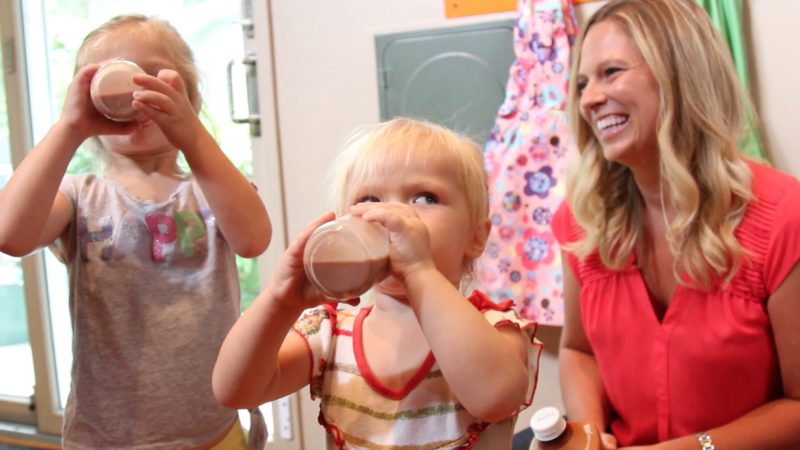You love your kids more than anyone else in the world. You want them to be happy, healthy, and strong. You can never imagine hurting them—ever. But suddenly you find yourself tiptoeing around the idea that one of them may have a weight problem. Your heart sinks as you recount the pizza nights, the constant rejection of vegetables, and your child’s general preference for “screen time” as physical activity. (At least Pokemon Go has walking involved!)
Take a deep breath. Exhale. Repeat.
If this feels like a “touchy” subject, that’s exactly how you should feel right now. Something that matters to you is at stake and these negative emotions are calling you—pay attention.
You have concerns for your child. Now that you’re dialed in, you can take action. What you do about it can make a big difference in whether they really improve their life.
Fact: kids body changes are awkward—many bodies can look pudgy, pototato-y, and rotund right before a growth spurt. Another fact: Some kids are just born to have excess body fat—and that’s OK too. It does not necessarily mean poor health.
Parents, your kids need you to be the calm, confident one.

Even if you are freaking out about your child’s habits, his weight, and his health, you can be doing more harm by engaging with these negative emotions around your kids.
Pause and tell yourself, “it’s OK to be here.” (Keep breathing.) Then give yourself a little confidence boost: “I can handle this. We will all be OK.” This helps you get in the right mindset for rational thinking—the key ingredient for successful behavior change.
Here’s the bottom line: Anyone can change their habits and everyone in the family will improve their health and well-being when they make sustainable lifestyle changes.
Put your weight concerns for your child on the back burner and focus on behaviors instead. The American Academy of Pediatrics recommends that parents avoid dieting, weight talk (including comments about your own weight), and weight teasing in order to help prevent obesity and eating disorders in adolescents.
It may sound ironic, but dieting behaviors actually double the risk of kids becoming overweight. Plant a firm foot on the ground—no dieting. That means you’re not going to restrict calories with the goal of weight loss or follow plans that are marketed as weight-loss plans.
Here are 4 other things you can do to get your family started on a happier, healthier path.
1. Talk to your pediatrician.
Be clear that you are concerned about your child’s health and let him or her know that you don’t want to focus on weight loss or diets. Ask your doctor about medical labs like cholesterol or blood sugar. Talk about your family genetics and health history. Ask your doctor to interpret the pattern of your child’s growth, height and weight over time. Tell him or her if anything in your child’s behaviors changed recently. Talk about puberty. Many of the body changes you’re interpreting as weight concerns could be normal and natural for your child. It doesn’t mean there are no habits to fix. But kids of all sizes should have healthy habits for their well-being so keep weight off the table.
2. Eat together as a family, as often as you can.
Don’t stress over the perfect meal—get help from the grocery store, use leftovers, add fruits and veggies. It’s OK if only one parent can make it. The act of sitting together at mealtime makes all the difference. The AAP guidelines suggest that frequent family meals are associated with healthier eating patterns, reduced dieting, and fewer eating disorders.
3. Be the one with the positive attitude.
Make changes as a family and involve everyone in meal planning. Positioning healthier eating as an adventure or experiment can pique kids’ interests. When they realize food still tastes good and they won’t be placed on a rigid diet, it’s satisfying. Ask your kids to brainstorm three things they may enjoy for movement and make sure they get exercise. The more they enjoy, the more motivated they will be. Don’t let them avoid any amount of effort, but let them take it slow and celebrate even little accomplishments (something I call spiral up). Tell them it’s not always easy, but their effort matters. This helps kids build a growth mindset and stokes their internal motivation to keep going.
4. Make sure your children know you love them no matter what.
Let them know that all bodies are good Tell them people can be different shapes, sizes, heights, weights, eye colors, and hair colors, and all be healthy, strong people. This will help them build a positive body image even if they don’t look like their friends. According to the AAP, approximately half of teenage girls and one-quarter of teenage boys are dissatisfied with their bodies. These numbers are higher in overweight teenagers. When kids struggle with body image, they are more likely to diet, avoid physical activity, and binge eat. Focusing on behaviors to be healthy and fit, as opposed to dieting for weight-loss goals, enhances a child’s body image and reduces their weight concerns.
Remember how this post began. You love your kids more than anyone else in the world. When you let love be your guide, you will help everyone in your family create a better life.
For more body positivity tips and healthy habits, check out my upcoming book Body Kindness, on sale this January.





1 Comment
Body Kindness Episode 12 - Worried about your child’s weight? How to handle it with Body Kindness - Rebecca Scritchfield
September 16, 2016 at 2:27 pm[…] advice to parents worried about their kids […]